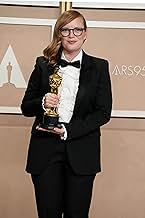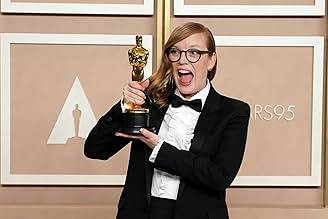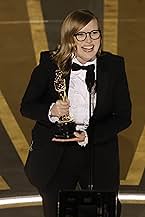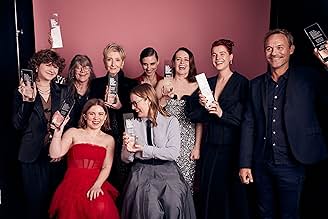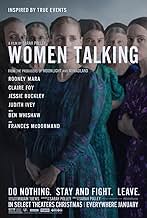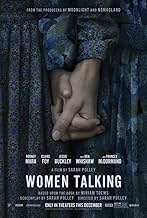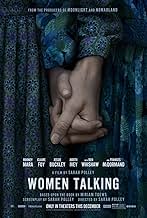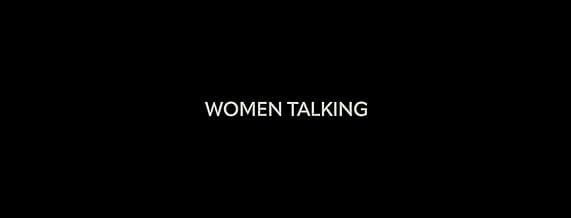Nel 2010 le donne di una comunità religiosa isolata sono alle prese con la riconciliazione della loro realtà con la loro fede. Basato sul romanzo di Miriam Toews.Nel 2010 le donne di una comunità religiosa isolata sono alle prese con la riconciliazione della loro realtà con la loro fede. Basato sul romanzo di Miriam Toews.Nel 2010 le donne di una comunità religiosa isolata sono alle prese con la riconciliazione della loro realtà con la loro fede. Basato sul romanzo di Miriam Toews.
- Vincitore di 1 Oscar
- 65 vittorie e 166 candidature totali
Recensione in evidenza
Sarah Polley's 'Women Talking' did not work for me. This story of a group of women - all of whom belong to a U. S. religious sect in the 1960's - who are physically and emotionally abused by their menfolk / husbands, seems more like a dispassionate, politically correct lecture, than a dialogue between real people. Real people in pain. And it should not have had that effect. Particularly in these times when the news is filled with detailed descriptions of what real men do to real women.
Rooney Mara, Claire Foy, and. Jesse Buckley play three young women who had been drugged and sexually accosted, and who are now part of a 'commission' asked to decide what the community's women's next steps should be. Should they remain in the community and say / do nothing, remain and fight back, or pack up and leave? In making their decision, each of the three young women describes their lives and their reasons for voting as they do. Rooney Mara's character seems the most undecided, willing to see all sides of the argument and taking different positions over the course of the film. Claire Foy is angry and outspoken but I found it difficult to ascribe a preferred next-step to her. Jesse Buckley is the angriest and, at first, the most unwilling to leave her abusive husband, and it is that - her failure to realize how abused she is - that made me care less about her than I should.
Two senior women participate in the commission and one, played by Judith Ivey - made the strongest impression on me. She has the wisdom that comes with age and the ability to put it into words. Ben Whishaw as the one man invited to the commission brings a startling honesty to the proceedings; he more than anyone knows the evil men can do.
But for me, the film's 'failure' involves the three young women. There is a cold and distanced quality to their recitals. It is as though they are relating a film they saw, a book they read, rather than expressing the anger, the anxiety, the fear they all know very well.
I should have been moved. I should have been angered. I should have been relieved. But I was not.
Rooney Mara, Claire Foy, and. Jesse Buckley play three young women who had been drugged and sexually accosted, and who are now part of a 'commission' asked to decide what the community's women's next steps should be. Should they remain in the community and say / do nothing, remain and fight back, or pack up and leave? In making their decision, each of the three young women describes their lives and their reasons for voting as they do. Rooney Mara's character seems the most undecided, willing to see all sides of the argument and taking different positions over the course of the film. Claire Foy is angry and outspoken but I found it difficult to ascribe a preferred next-step to her. Jesse Buckley is the angriest and, at first, the most unwilling to leave her abusive husband, and it is that - her failure to realize how abused she is - that made me care less about her than I should.
Two senior women participate in the commission and one, played by Judith Ivey - made the strongest impression on me. She has the wisdom that comes with age and the ability to put it into words. Ben Whishaw as the one man invited to the commission brings a startling honesty to the proceedings; he more than anyone knows the evil men can do.
But for me, the film's 'failure' involves the three young women. There is a cold and distanced quality to their recitals. It is as though they are relating a film they saw, a book they read, rather than expressing the anger, the anxiety, the fear they all know very well.
I should have been moved. I should have been angered. I should have been relieved. But I was not.
Trama
Lo sapevi?
- QuizExplaining the color grading of the film, director Sarah Polley said the filmmakers played with saturation levels to create a feeling of "a world that had faded in the past." This is why the film appears to be almost black and white, but not quite.
- BlooperNettie identifies as a man name "Melvin". The Mennonite do not allow members to identify as anything other than their biological sex and gender. In real life, Nettie would have been excommunicated. There are over one hundred different Anabaptist (Amish, Brethren, Hutterite, Mennonite) church groups, counting more than 6,000 congregations, all holding to slightly different traditions and their own interpretations of the Bible. The movie never identified the Anabaptist group of the colony.
- Colonne sonoreDaydream Believer
Written by John Stewart
Performed by The Monkees
Courtesy of Rhino Entertainment Company
By arrangement with Warner Music Group Film & TV Licensing
I più visti
Accedi per valutare e creare un elenco di titoli salvati per ottenere consigli personalizzati
Dettagli
- Data di uscita
- Paese di origine
- Sito ufficiale
- Lingua
- Celebre anche come
- Ellas hablan
- Luoghi delle riprese
- Enercare Centre, 100 Princes' Boulevard, Toronto, Ontario, Canada(Barn interior scenes)
- Aziende produttrici
- Vedi altri crediti dell’azienda su IMDbPro
Botteghino
- Lordo Stati Uniti e Canada
- 5.456.531 USD
- Fine settimana di apertura Stati Uniti e Canada
- 40.530 USD
- 25 dic 2022
- Lordo in tutto il mondo
- 9.276.103 USD
- Tempo di esecuzione1 ora 44 minuti
- Colore
- Proporzioni
- 2.76 : 1
Contribuisci a questa pagina
Suggerisci una modifica o aggiungi i contenuti mancanti

Divario superiore
What is the streaming release date of Women Talking - Il diritto di scegliere (2022) in India?
Rispondi
























